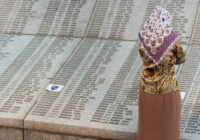A well-trained military is crucial to a functioning civil democracy, but it can be a liability too.
Within hours of the death of Guinea’s president in 2008, four officers trained by the German military launched a coup d’état. Led by Captain Moussa Dadis Camara, who proudly wore the red beret and insignia of a German paratrooper, the plotters communicated discreetly in German. Following an assassination attempt, Camara was replaced by a French-trained paratrooper who had been his vice president.
And so two officers trained by European states to enhance security and civilian control in their home countries took it upon themselves to seize power through violence. Now known as the “German coup,” this story is a warning to all those world powers moving to train and support foreign militaries — in particular the European Union, which is stepping up its efforts in this department and establishing a new military training headquarters.
According to Federica Mogherini, the EU foreign policy chief, the aim is to provide a “more efficient approach to the existing military training missions we have” in countries such as Mali, Somalia and the Democratic Republic of Congo.
But training men with guns in under-resourced and under-institutionalized states is a very risky proposition. Military training provided from abroad can destabilize a recipient state’s politics, altering the balance of power between certain military actors and the government. Boosting the resources of security forces can encourage them to participate more actively in domestic politics, up to and including coups.
On an individual level, training can raise a trainee’s status and professionalize them, helping them win over other officers and more effectively tackle the organizational barriers that coup plotters typically face. Professionalized military officers can increase their autonomy, and alienate them from corrupt and dysfunctional civilian elites. Our argument is amply supported by the United States’ experience of trying to help stabilize developing democracies, only to see its efforts backfire.
If taken on its own, America’s security assistance spending would be the world’s fourth largest foreign aid budget ($17 billion). While the primary goal of the US when providing training is to promote its own security, it also actively tries to prevent coups, incorporating civil-military relations into its training and typically cutting off funding to states after militaries seize power. Despite this emphasis on limiting military interventions in politics, there are numerous cases of US-trained officers launching coups: Egypt in 2013, Gambia in 2014, Burkina Faso in 2014 and Honduras in 2009.
A particularly salient example is the 2012 coup in Mali, which was led by a junior officer named Amadou Sanogo. Through the US International Military Educational and Training program, Sanogo saw more of the US than do most Americans: English classes in Texas, an intelligence course in Arizona, work with the marines in Virginia and, finally, army infantry officer basic training in Georgia.
Sanogo was so Americanized that, when he returned home, he took to wearing an oversized (and unauthorized) US Marine Corps badge on his uniform. Assigned to teach English back in Mali, he used his position to lead a group of mutinying soldiers on his home base to seize power and fight off a counter-coup.
Reluctantly ceding informal power a year later due to tremendous domestic and international pressure, he was quickly arrested on charges of kidnapping and assassinating rivals within the military.
 So what do the data say? When we looked at all instances of US military training from 1970 to 2009, we found that roughly 5% of countries that received training experienced a military-backed coup attempt, compared to 2.7% of those not receiving training.
So what do the data say? When we looked at all instances of US military training from 1970 to 2009, we found that roughly 5% of countries that received training experienced a military-backed coup attempt, compared to 2.7% of those not receiving training.
Using more sophisticated statistical techniques, we discovered that these training programs were significantly correlated with an increase in the probability of a coup. For the average case, this increase in probability amounts to a doubling of the risk, in absolute terms a move from 1% to 2% in a given year. While the probabilities are low, the relative change is large, and since coups can be catastrophic for the countries in which they occur, it’s crucial to try and understand why this relationship might exist.
The organization of a formal military is a vital part of any country’s development. Because they control a state’s coercive capacity, militaries can either promote stability or undermine it. The US does not (usually) aim to promote coups and often cuts off aid to militaries that launch them, but coups are nonetheless an occasional consequence of international training programs. Both the US and the EU should be careful to consider what the military training they provide might one day amount to.
*[This article was originally published by The Conversation.] ![]()
The views expressed in this article are the author’s own and do not necessarily reflect Fair Observer’s editorial policy.
Photo Credit: memmore / Shutterstock.com
Support Fair Observer
We rely on your support for our independence, diversity and quality.
For more than 10 years, Fair Observer has been free, fair and independent. No billionaire owns us, no advertisers control us. We are a reader-supported nonprofit. Unlike many other publications, we keep our content free for readers regardless of where they live or whether they can afford to pay. We have no paywalls and no ads.
In the post-truth era of fake news, echo chambers and filter bubbles, we publish a plurality of perspectives from around the world. Anyone can publish with us, but everyone goes through a rigorous editorial process. So, you get fact-checked, well-reasoned content instead of noise.
We publish 2,500+ voices from 90+ countries. We also conduct education and training programs
on subjects ranging from digital media and journalism to writing and critical thinking. This
doesn’t come cheap. Servers, editors, trainers and web developers cost
money.
Please consider supporting us on a regular basis as a recurring donor or a
sustaining member.
Will you support FO’s journalism?
We rely on your support for our independence, diversity and quality.






